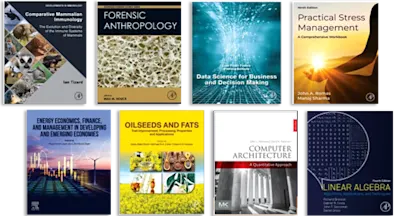
Cann's Principles of Molecular Virology
- 7th Edition - February 16, 2023
- Imprint: Academic Press
- Author: Edward P. Rybicki
- Language: English
- Paperback ISBN:9 7 8 - 0 - 1 2 - 8 2 2 7 8 4 - 8
- eBook ISBN:9 7 8 - 0 - 1 2 - 8 2 2 7 8 5 - 5
**Selected for Doody’s Core Titles® 2024 in Microbiology**Cann's Principles of Molecular Virology, Seventh Edition provides an easily accessible introduction to modern v… Read more
Purchase options

Cann's Principles of Molecular Virology, Seventh Edition provides an easily accessible introduction to modern virology, presenting principles in a clear and concise manner. The new edition provides the history of virology and the fundamentals of the molecular basis of how viruses work. It discusses the interactions which control the structure of virus particles, the ways viruses infect cells, how viruses replicate themselves, and the consequences and pathogenesis of virus infection for host organisms. This fully updated edition also reflects advances made in the field and includes new content on phage therapy, CRISPR as a phage defense / offense system, new ideas about evolution, and giant viruses. With the addition of ancillary resources, Principles of Molecular Virology, Seventh Edition is an essential foundational reference for academics, graduate students, and advance undergraduates in virology, molecular biology, and microbiology as well as researchers entering virology, infectious disease, and immunology research.
- Provides a conceptual approach to the principles of molecular virology, with important examples of new advances in virology
- Includes new concepts in this edition include coverage of emerging topics and new technologies in viral research like phage therapy, CRISPR as a phage defense / offense system, new ideas about evolution, and giant viruses
- Contains updated learning outcomes and further reading for each chapter
- Supported by online resources for students and instructors
Preface
1. What are viruses, and how were they discovered?
Introduction
The history of the discovery of viruses
References
Recommended Reading
2. Viruses and their particles
Viruses and their particles
Virions
References
Recommended reading
3. Virus origins and genetics
The structure and complexity of virus genomes
Origins of viruses
From what did viruses evolve?
The origins of modern eukaryote viruses
Of ERVs and EVEs
The complexity of virus genomes
Molecular genetics
Virus genetics
The global virome
Epidemiology
Summary
References
Recommended reading
4. Virus genomes and their replication
Overview of virus replication
Entrance into cells and viral genome
replication
Genome replication and gene expression
Assembly of virions
Summary
References
Recommended reading
5. Expression of virus genomes
Expression of genetic information
Virus genome coding strategies
Transcriptional control of expression
Posttranscriptional control of expression
Summary
References
Recommended reading
6. Infection and immunity
Virus infection of prokaryotes
Virus infections of plants
Immune responses to virus infections in animals
Innate immune responses
Adaptive immune responses in vertebrates
RNA interference
Virus-host interactions
The course of virus infections
Prevention and therapy of virus infection
Viruses as therapeutics
Chemotherapy of virus infections
Summary
References
Recommended reading
7. Viral pathogenesis
Mechanisms of cellular injury
Viruses and immunodeficiency
Acquired immunodeficiency syndrome
(AIDS)
Virus-related diseases
Bacteriophages and human disease
Cell transformation by viruses
Cell transformation by retroviruses
Cell transformation by DNA viruses
Viruses and cancer
Summary
References
Recommended reading
8. Panics and pandemics
New, emerging, and re-emerging viruses
Re-emerging viruses
Plant viruses
Novel human viruses
Zoonoses
Biowarfare and bioterrorism
Summary
References
Recommended reading
9. Subviral agents: Deltaviruses and prions
Hepatitis delta virus
Prions
Molecular biology of prions
References
Recommended reading
Appendix 1
Index
- Edition: 7
- Published: February 16, 2023
- Imprint: Academic Press
- Language: English
ER